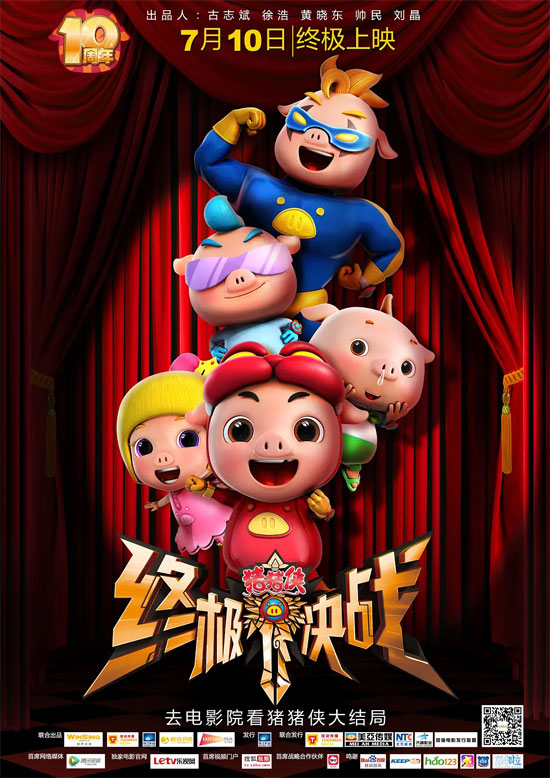Film Name: 猪猪侠之终极决战 / GG Bond Movie:Ultimate Battle

As the final installment of this summer’s animated trilogy—Piggy Hero—stands out among its two counterparts (Three Little Pigs and Piggy Banna) with a more confidently established world-building foundation. Characters like Piggy Hero’s father and Happy Lamb’s mother are naturally suited for theatrical releases, as young audiences who’ve watched the TV series for years develop innate curiosity toward these enigmatic figures—familiar by identity yet unfamiliar in their cinematic incarnations.
If you saw “Brave Rabbit 2: Crazy Circus” earlier this year, you’ll notice “GG Bond” shares a similar narrative arc: a fundamentally good acquaintance becomes a villain due to unspoken hardships, battles the protagonist, and ultimately redeems themselves. Beyond the grand battle scenes, the emotional bonds between the protagonist’s team and the antagonist serve as an eternal tearjerker—though neither film managed to make me cry.
If we delve into the touching sentiments, we find that family and friends possess two entirely different points of influence. Family resonates through selfless devotion, while friendship strikes through loyalty. The presence or absence of blood ties decisively shapes the emotional dynamic between two people. You cannot reduce familial bonds to mere loyalty, nor romanticize friendships as love. Clearly, “GG Bond Movie: Ultimate Battle” confuses these two moving sentiments, preventing it from achieving ultimate emotional impact.
The emotional core between father and son should stem from paternal love. In the film, Piggy Hero’s father acts out of a desire to reunite with Piggy Hero’s mother, with little focus on his love for his son. Even when they share moments together, it’s often Piggy Man Dad exploiting Piggy Man for his own ends. This makes his final transformation—from manipulating Piggy Man to battling him, then suddenly showing affection—utterly baffling. His devotion should be directed toward Piggy Man’s mother, not Piggy Man himself.
Consider “Big Hero 6,” an animated film centered on familial bonds. Its emotional resonance is unambiguously anchored in the love between family members. When Hiro watches the footage of his brother failing over 80 times before finally succeeding in creating Baymax to protect him, I doubt anyone could remain unmoved. What a magnificent brother—his love for his sibling is so profound and selfless. And it’s precisely because of this love that when Baymax, carrying the brother’s chip, sacrifices himself in another dimension to save Hiro, you find yourself weeping uncontrollably.
Family members rarely express “affection” through life-or-death battles; such scenarios typically unfold between friends. One of the most memorable aspects of the early Japanese anime “Mashin Eiyuuden Wataru” is the precious friendship formed between the protagonist and his friend Tiger King, followed by the emotionally charged plot where they are forced to become adversaries and fight. Such conflicts between friends are natural, reflecting a sense of equality. However, a father hysterically attacking his own child is an utterly unacceptable narrative. Even a showdown between Superman-level villains and Piggy Hero would resonate far more humanly than a father-son battle.
This is why in “Frozen,” the sisters never engage in sustained physical conflict—only emotional withdrawal and estrangement.
Piggy Hero’s father is designed as a handsome, cool character. His appearance starkly contrasts with Piggy Hero’s adorable, stocky build and red color scheme. Without context, viewers might mistake him for a random handsome stranger rather than the boy’s father. This stylistic detachment signifies that the father figure is not fundamentally a parent but merely a friend.
By framing a story that should explore friendship through the lens of familial identity, the film creates a profound sense of dissonance for the audience. While it may still evoke emotion, that emotion feels awkward and unnatural, ultimately losing its authenticity and impact.
Please specify:Anime Phone Cases » GG Bond Movie:Ultimate Battle 2015 Animation Film Review: The Chain Reaction Triggered by a “Hua” Suffix on Tang Seng